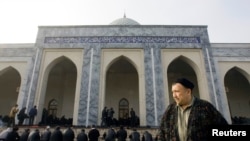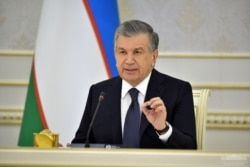A U.S. government body that monitors global religious freedom is recommending that the State Department include Uzbekistan on its special watchlist (SWL) because of Tashkent's incarceration of 2,000 mostly observant Muslims on charges of religious extremism.
In its 22nd annual report published Wednesday, the independent, bipartisan U.S. Commission on International Religious Freedom (USCIRF) said Uzbekistan merits the designation for engaging in or tolerating "severe violations" of religious freedom.
The USCIRF 2021 report recommends an additional 11 countries for the State Department’s SWL: Afghanistan, Algeria, Azerbaijan, Cuba, Egypt, Iraq, Indonesia, Kazakhstan, Malaysia, Nicaragua and Turkey.
"We urge the Uzbek government to continue to make tangible improvements on its religious freedom and human rights records," USCIRF Commissioner Nury Turkel told VOA, calling on the government of President Shavkat Mirziyoyev to release an estimated 2,000 people incarcerated for religious activity nationwide.
"Mirziyoyev's government has been trying to make some notable improvements to religious freedom conditions in Uzbekistan in recent years," Turkel said. "Nevertheless, the Uzbek government still has to release those religious prisoners of conscience, some of whom have remained locked up for many years."
Home to nearly 33 million people, the majority Muslim Central Asian republic had been designated a "country of particular concern" (CPC) by U.S. officials from 2006 to 2019, after which the State Department elevated Uzbekistan to the SWL, citing some progress toward broader religious freedom.
CPC is a State Department designation for countries that engage in or tolerate "'particularly severe violations of religious freedom" under the International Religious Freedom Act of 1998, whereas the second-tier SWL designation is reserved for countries that engage or tolerate "'severe' violations."
According to the USCIRF 2021 report, Mirziyoyev, who assumed power in 2016 following the death of former President Islam Karimov, had in 2020 made some reforms to improve religious freedom conditions in Uzbekistan that "trended positively."
"Over the course of [2020], the government registered at least eight non-Muslim religious organizations, ended a de facto ban on children attending mosques, interceded to prevent the eviction and demolition of a synagogue located in Tashkent, and released some religious prisoners," the report said.
Independent Muslims
USCIRF also noted, however, that Uzbek authorities continued to harass, detain and imprison Muslims who practiced Islam independently of strict state controls or possessed unauthorized "extremist" sermons and other religious texts in print or electronic form.
According to the USCIRF report, although the government of Uzbekistan had pardoned and reduced sentences for some religious prisoners throughout 2020, thousands remained imprisoned.
"Moreover, in 2020 the government arrested an undetermined number of individuals under broad and ill-defined charges of 'extremism' that many observers viewed with skepticism given Uzbekistan’s 'history of alleging extremism accusations to target political opposition' and religious individuals," the report charges.
Uzbekistan, which defends its religious freedom record, has downplayed the accusations. Discussing religious freedom with journalists in February, Uzbek Justice Minister Ruslanbek Davletov denied that any restrictions exist.
"We must recognize Uzbekistan’s achievements in freedom of thought, conscience and religion," Davletov said at the time, adding that the Ministry of Justice would continue to work to ensure the religious rights and freedoms of every person.
In March, the U.N. Human Rights Committee expressed its concerns about the persistence of torture in prisons and other detention facilities and the use of arbitrary arrest, detention and torture of independent Muslims in the country.
Using its religious freedom findings, USCIRF makes policy recommendations to the White House, State Department and U.S. Congress.
The watchdog commission also listed Burma, China, Eritrea, Iran, Nigeria, North Korea, Pakistan, Saudi Arabia, Tajikistan and Turkmenistan for CPC redesignation.
It also called for adding India, Russia, Syria, and Vietnam to the CPC list.





